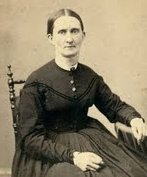 Tennessee Wrath or Home Front Frustration, was a tale that Grandma Belle shared with a young Bummer, that described how a neighbor dealt with the steady flow of Union soldiers in and around Murfreesboro, Tennessee in the Fall of 1862. Even though the divide between friends and kin meant carnage on the field of battle, the women left at home were shackled with a deep seated resentment at their inability to contribute significantly to their individual cause. Before she began the story she pulled a folded, yellowed clipping from a newspaper of the era. Grandma’s Tennessee Tale began,
Tennessee Wrath or Home Front Frustration, was a tale that Grandma Belle shared with a young Bummer, that described how a neighbor dealt with the steady flow of Union soldiers in and around Murfreesboro, Tennessee in the Fall of 1862. Even though the divide between friends and kin meant carnage on the field of battle, the women left at home were shackled with a deep seated resentment at their inability to contribute significantly to their individual cause. Before she began the story she pulled a folded, yellowed clipping from a newspaper of the era. Grandma’s Tennessee Tale began,
A General who, in his province as commander of the brigade, had called at the dwellings on the road-side, to see about the sick soldiers left in the houses, the General knocked at a door, and a voice within yelled “Come in.” Obeying the injunction, he opened the door, and inquired how many men were there, and, also, if they had the requisite attention shown them. After a few minutes’ talk with the soldiers, the General entered into conversation with the owner of the property, who, among other things, asked the General when he thought the war would end; to which the General replied:
“Not till the rebels lay down their arms, or the Secessionists get perfectly tired of having their country devastated.”
This reply brought in a third party—the old Granny, a regular spitfire, a she-Secessionist of the most rabid, cantankerous species—a tiger-cat in petticoats. This she specimen of the “Spirit of the South,” of the demon of desolation, had bottled up her venom during the conversation of her son, but could hold in no longer; her vial of wrath “busted,” the cork flew out, and the way she came at the General was a caution to the wayfarers over this road, at any rate. Granny railed,
“O, yes! and that’s all you nasty Yankees come here for, is, to destroy our property, invade our sile, deserlatin’ our homes. This ‘ere whole war is nothing but a Yankee speculation, gotten up by the North, so that they can steal our slaves and drive us from our homes.”
The General, not missing a beat, stated,
“Well, madam, as it is not my province to quarrel with a woman, I shall not talk to you. You get excited, and don’t know what you’re talking about.”
Granny, not to be out done, retorted,
“O! but I’ll talk to you as much as I please. You’re all a sneaking set of thieves. You can just take yourself out of my house, you dirty pup. You’re drunk.”
The General very placidly listened to the old termagant, and merely remarked, “It was too cold to go out of the house just then; he guessed he’d warm himself first.”
“Get out, quick,” said Granny, opening the door. “I’ll let you know I’m a Harney. Yes, I’m a grand-daughter of General Harney, of Revolutionary fame.”
The General, trying to stay calm, stated,
“Well, madam, I have before told you I don’t want to quarrel with a woman, but if you have any of the male Harneys about the house, who will give me the tenth part of the insolence that I have listened to from the lips of ‘one old enough to know better,’ I will soon show him of what mettle I’m made.”
Granny became unhinged,
“Jeemes, give me your six-shooter,” fairly shrieked the old woman; “I’ll soon show him. I’ll fight you at ten paces, sir!”
The General laughed at her last remark; seeing which, she became perfectly furious. Her sons and daughters begged her to desist from such talk; but the more they cried “Don’t,” the less she “don’ted.”
The family, by this time, had been made aware that it was a real General at whom this insolence of tongue was being hurled, and the tribulation of the son was great. The General, after thoroughly warming himself, quietly walked out with his staff. The son followed to the door, making all sorts of apologies for his mother—that she had been sick, was peevish, and, at times, out of her head. It was suggested to the son, that Granny wouldn’t be so apt to go out of her head if John Morgan had come along, instead of a Union man.
Lucky for that house and its inmates that the brigade or any of the General’s command, were not apprised of the proceedings. The General, in the kindness of his heart, and for the sake of the soldiers quartered there, placed a guard around her house, to prevent her being troubled in the least while the regiments were passing.
Grandma Belle had known this family for years and in other times they had been the best of friends. She shared how devisive the Rebellion was and how bitter the Tennessee Wrath and the Homefront Frustration had become.
Bummer

